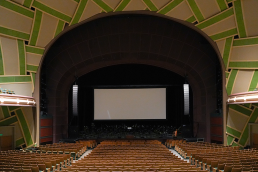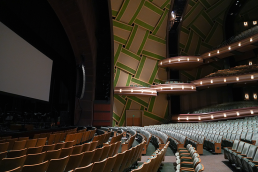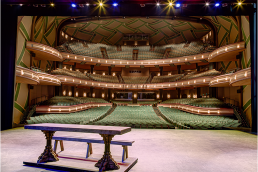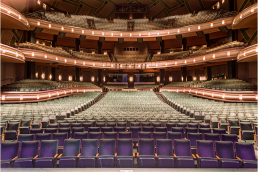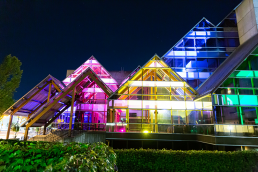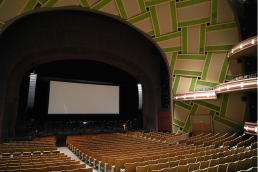This website uses cookies so that we can provide you with the best user experience possible. Cookie information is stored in your browser and performs functions such as recognising you when you return to our website and helping our team to understand which sections of the website you find most interesting and useful.
Hult Center
ProjectHult CenterLocationEugene, OregonInstallerGeorge Relles Sound, IncAcousticianGeorge RellesSubmitted byMeyer Sound
After nearly eight years of regular visits on a rental basis, Meyer Sound LEOPARD compact line array loudspeakers have taken up permanent residence in the Silva Concert Hall of the Hult Center for the Performing Arts in Eugene, Oregon.
The rental system was provided by locally based George Relles Sound, Inc., with the company returning earlier in 2023 as the integrator for the permanent installation. The new resident system made its debut in the 2,447-seat venue with a performance of Missa Gaia (Earth Mass) by the Eugene Concert Choir with composer Paul Winter as the featured soloist. One week later, the system supplied sound for a showing of Star Wars: Return of the Jedi, with a live performance of the John Williams score by the Eugene Symphony.
“Everything is going great with our new system,” said Hult Center General Manager Jeff Weinkauf. “But of course, that is hardly a surprise. I’ve heard it many times over the years, and I’m always blown away by the clarity, depth, and consistency. George [Relles] said several times — somewhat jokingly — that we might as well buy one of our own. Finally, we were able to make that happen.”
In addition to ‘pops’ style concerts and movie soundtracks with the Eugene Symphony, a cross-section of past performances supported by the essentially identical LEOPARD system includes Patti Labelle, the Chick Corea Elektric Band, Pink Martini, Bob Weir & the Wolf Bros., B.B. King, and Buddy Guy.
Weinkauf, who previously served as Operations Director and Technical Director at the Hult Center, had ample opportunity to evaluate alternatives for a permanent ‘A+’ solution. “Many touring pop and Broadway shows carry their own production, so I’d heard solutions from most of the major manufacturers in our space,” he said. “Consistently, the Meyer Sound systems outperform the others in here. We always seemed to get more positive comments when the show was carrying Meyer Sound.”
The installed system comprises main left and right hangs of 14-each LEOPARD compact line array loudspeakers, one more than with the typical rental system. Three ULTRA-X40 compact loudspeakers are installed as balcony delays. “For most shows, the delays aren’t critical because the LEOPARDs cover the balcony very well,” noted Relles. “But if there’s a lot of level coming off the stage from a loud band, and it’s exciting the room, the delays will help boost the clarity up there.”
The top twelve LEOPARD loudspeakers are the M80 variant, with the narrower 80-degree horizontal pattern limiting reflections off the side walls. The bottom two loudspeakers employ the standard 110° waveguide. Front fills are six ULTRA-X20 compact wide-coverage loudspeakers, and deep bass is propelled by three-per-side gradient cardioid arrays of 1100-LFC low-frequency control elements.
“Sometimes we would get questions about having only six subs,” admitted Weinkauf. “People will walk in, take a look, and say, ‘Is that really going to be enough?’” Then we fire it up and they say, ‘That will be fine.’ Of course, we can always have George bring in a few more, if only for the visual effect.”
Relles’ long experience with LEOPARD arrays in the room made system tuning a snap. “One TruShaping filter and a couple of parametrics with just a few dB was all it took,” he recalled. “Since I already had the Compass files from previous visits I basically had the system ready in less than fifteen minutes.”
Relles and Weinkauf had discussed an option for the new PANTHER large‑format linear line array loudspeaker, but soon concluded it would be more than the room needed. The first trials proved the point. “After I tuned the LEOPARDs we played tracks from all genres, ending up with some heavy metal,” said Relles. “We still had six to eight dB of headroom but everybody was screaming ‘Enough!’ at the top of their lungs.”
The system upgrade also included MJF-208 and MJF-210 stage monitors, with more of each model on order. “We still have our old monitors, but after hearing the MJF wedges, the techs in both of our rooms are specifying them for their shows. Artists love the way they sound. They’re lightweight, powerful, and so easy to dial in with very little — if any — corrective EQ needed.”
Having their own premier system available at all times allows the Hult Center more certainty and flexibility in programming, continued Weinkauf: “This gives our programming manager, Vicki Infinito, a new tool for attracting and booking top-rank artists. George is a sought-after provider for our region, so he was not always available to bring in his LEOPARD system. Also, we are seeing more acts touring only with desks, making this upgrade a high priority. We are already booking top-tier acts for the fall that might have passed us by if we didn’t have this system available in-house.”
Operated by the City of Eugene Cultural Services Division and opened in 1982, the Hult Center for the Performing Arts is renowned for its striking exterior and the novel basketweave interior of the Silva Concert Hall.
